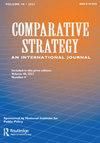后苏联空间陷入修昔底德陷阱:把握俄罗斯的零和行为
Q3 Social Sciences
引用次数: 0
摘要
摘要目睹了后苏联国家亲西方的转变,俄罗斯未能制定出吸引前苏联卫星而不通过硬实力将其保留在其势力范围内的政策。另一方面,西方的价值观、政治影响力和制度渗透到欧亚国家,导致俄罗斯的相对衰落。这种结构性动态不仅使俄罗斯陷入与西方的零和游戏,还引发了俄罗斯在单位层面的威胁感知。俄罗斯战略文化强调对俄罗斯政权主权丧失或权力转移的担忧,这可能意味着当前体制的结束、边境安全和大国地位的复活。这些威胁认知和结构转变的结合体现在后苏联时代预防性战争背后的古老困境“修昔底德陷阱”中。本文章由计算机程序翻译,如有差异,请以英文原文为准。
Post-Soviet space caught in Thucydides Trap: Grasping the Russian zero-sum behavior
Abstract Witnessing the pro-Western shifts in the post-Soviet countries, Russia has failed to develop policies that would attract the former Soviet satellites without keeping them in its sphere of influence via hard-power. On the other hand, Western values, political influence and institutions have penetrated Eurasian countries causing Russia’s relative decline. This structural dynamic not only entraps Russia in a zero-sum game with the West but also triggers Russian threat perceptions on the unit level. Russian strategic culture emphasizes anxieties about loss of sovereignty or power shifts in the Russian regime that could mean the end of the current establishment, border security, and great power status resurrection. A combination of these threat perceptions and structural shifts manifests in the Thucydides Trap, an ancient dilemma behind the preventive war, in the post-Soviet space.
求助全文
通过发布文献求助,成功后即可免费获取论文全文。
去求助
来源期刊

Comparative Strategy
Social Sciences-Political Science and International Relations
CiteScore
0.90
自引率
0.00%
发文量
41
 求助内容:
求助内容: 应助结果提醒方式:
应助结果提醒方式:


